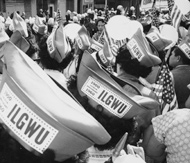

Highlights
Murder, Mayhem and the Mob!
In the 1957 film “The Garment Jungle,” Alan Mitchell returns to New York City in the hopes of learning the family business. His father, Walter, is an owner of Roxton Fashions, a garment factory and showroom manufacturing women’s dresses. With the “accidental” death of his father’s business partner down an elevator shaft, Alan teams up with ILGWU organizer Tulio Renata to learn that his father has been paying the mob for years to keep the union out of the shop. Amidst more murder and mayhem, Alan works with the ILGWU to save the company from thugs and organize the workers.
“Dear Uncle Lou…” begins many letters in the archive related to the motion picture “The Garment Jungle.” Gordon Stulberg wrote to his uncle, ILGWU executive vice-president Louis Stulberg, in his capacity as an assistant at Columbia Pictures, the studio producing the film. The ILGWU was involved in the movie from the very beginning, as Columbia Pictures contacted the union for various permissions. Most remarkable, the archive contains a first estimating draft of “The Garment Jungle” (then titled “Garment Center”) from June 21, 1956. The use of the International Ladies’ Garment Workers’ Union name in the film was subject to script approval by the union. The ILGWU was sent an early draft of the script to read and comment on scenes. Correspondence between the union and Columbia Pictures includes the use of the name “ILGWU” in the movie, as well as obtaining permissions for names, sites, and events. The studio wanted the ILGWU to check over character names to make sure there were not already individuals in the union with those monikers. For instance, the character of Local 22 manager Dave Zimmer was changed to Dave Felton, to avoid any similarity with the actual manager of ILGWU Local 22, Charles Zimmerman. Additionally, endorsement was also sought for the use in the script of actual incidents, including the murder of a union organizer, which referenced the murder of actual ILGWU organizer William Lurye. Also contained within the collection are signed location contracts with Columbia Pictures for permission to shoot on union premises and in union owned buildings, such as the ILGWU Cooperative Village and the offices of ILGWU Local 22—all which can be recognized in the final film (5780/003, Box 3, Folder 10).
During filming, the title and director changed, prompting unease within the union. In correspondence with screenplay writer Harry Kleiner, he assures the union that no real changes had been made to the story line, only minor “artistic” alterations, and maintained that the ILGWU would still “look good.” Furthermore, there are typed telephone conversations with the original director, Bob Aldrich, and the editor of the ILGWU publication Justice, Leon Stein, from December 7, 1956 over the director’s departure from the film. Aldrich informs Stein that he was fired over “artistic differences” and voices concern over the final product. And both Stein and Aldrich were unhappy with the name change to “Garment Jungle.” Stein stated that “permission to use our name was on the basis of the script, intention, attitude of mind of the director at that time” and with the rash of alterations, the ILGWU became worried with the depiction of the union and organized labor in the film (5780/069, Box 6, Folder 4).
Additional material in the archives includes promotional posters, articles and newspaper clippings discussing the opening of the film, and lists of theater screenings for branches and locals. While the film was successful in New York City, a letter to ILGWU President David Dubinsky form Columbia Pictures on July 3, 1957, reveals that the film was not as well received by the public as originally hoped, and performance in industrial areas such as Cleveland, Detroit, Philadelphia, San Francisco, and Boston, had been poor. Furthermore, the studio was seeking Dubinsky’s sponsorship and a supportive statement in the hopes that it would help the film internationally (5780/069, Box 6, Folder 4).
So come and see for yourself this controversial film noir about racketeering in the garment industry and the ILGWU and check out the script, correspondence, and articles in the archives!


